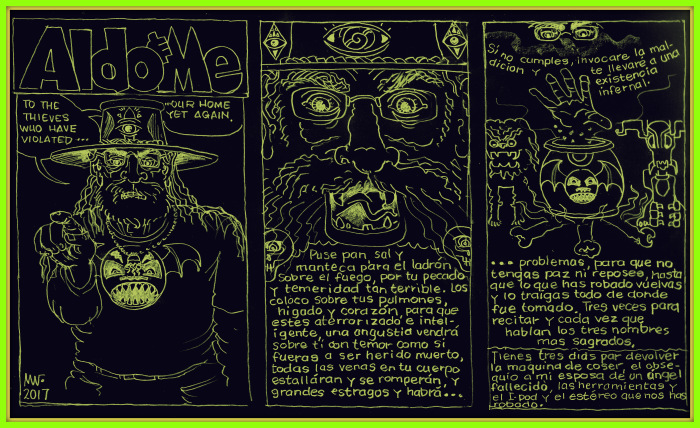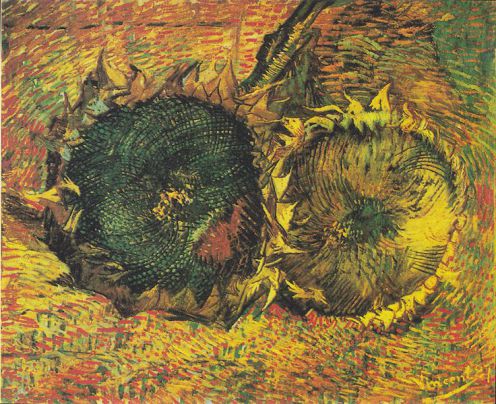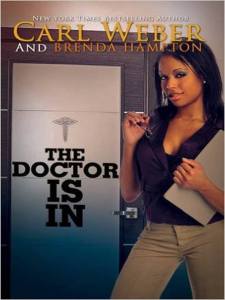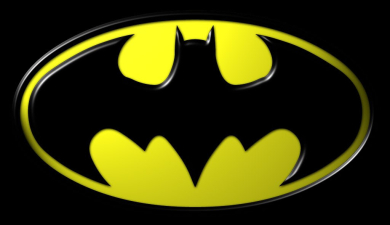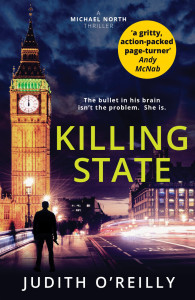
Killing State by Judith O’Reilly
Synopsis:
The bullet in his brain isn’t the problem. She is.
Michael North is a hero, with a bullet in the brain to prove it. A bullet which has rewired his neural pathways and heightened his sense of intuition. A bullet which is driving him mad. Working for an extra-governmental agency called The Board, North knows one thing for sure. He is very good at killing very bad guys. But what happens when a hero is ordered to kill a good woman rather than a bad man? Because it turns out that rising political star, Honor Jones, MP, can’t stop asking the right questions about the wrong people.
He should follow orders.
Shouldn’t he?
Q&A:
Q) For the readers, can you talk us through your background and the synopsis of your new novel?
A) Before I started writing I was a journalist. I worked in the lobby and I was education correspondent for The Sunday Times and before that a political producer, first for Channel 4 News and then for Newsnight. Being a journalist, of course, is all about telling a story.
Killing State is the book I’m bringing out now. Before Killing State, came Wife in the North and A Year of Doing Good (both of which were published by Viking, Penguin). Wife in the North was a bestseller/Radio 4 Book of the Week/serialised etc. which was absolutely great, but I really wanted to try my hand at fiction writing. It took me a lot of hard work to get my head round how to write a novel. It’s harder than I ever imagined.
Synopsis
The bullet in his brain isn’t the problem. She is.
Michael North is a hero, with a bullet in the brain to prove it. A bullet which has rewired his neural pathways and heightened his sense of intuition.
A bullet which is driving him mad.
Working for an extra-governmental agency called The Board, North knows one thing for sure.
He is very good at killing very bad guys.
But what happens when a hero is ordered to kill a good woman rather than a bad man? Because it turns out that rising political star, Honor Jones, MP, can’t stop asking the right questions about the wrong people.
He should follow orders.
Shouldn’t he?
Q) Can you talk us through the journey from idea to writing to publication?
A)Where did the idea come from? I’m interested in mortality, morality and the mind. I wanted a quirky British hero rather than your all-guns-blazing hero, and obviously a hero has to be vulnerable or you know from the get-go he will vanquish all-comers and that would be dull. But, I didn’t want him to be middle-aged like a lot of detectives. I liked the idea of him being a young man which means he’s more reckless than he should be. Friendship is also very important to me (maybe because I’m an only child so I invest particularly heavily in my friends.) I liked the idea of exploring how far a woman would go to get her best mate out of trouble. Turns out – right to the brink. As for the whole journey. Basically I wrote a draft. Chucked half of it out. Wrote it all over again and kept re-writing till I thought it held together. It’s intricately plotted, because conspiracies often are.
Q) What are your favourite authors and recommended reads?
A) Lee Child – I’ve read everything he’s written. Queen of Crime, Martina Cole (love the vividness of her characters and story-telling. I’ve also met her and she is incredibly generous and supportive to new writers). Margaret Attwood, who I discovered as a teenager and never let go. Robert Galbraith (J K Rowling’s hero, like mine, is a wounded ex-soldier). Raymond Chandler. Dashiell Hammett. John D. MacDonald. (I go through phrases and read everything an author’s written.) Love Anthony Trollope. Love Anne Tyler’s writing. So elegant. Life is too short to read shoddy writing. Just getting into John Connolly’s Charlie Parker, and Philip Kerr’s Berlin noir books featuring Bernie Gunther. Armistead Maupin is a beautiful writer I very much admire. Then there is John Le Carré, Robert Harris, James Patterson, Andy McNab. I enjoy the great Sophie Hannah. Charles Cumming. A personal favourite of mine is Mick Herron’s outstanding Jackson Lamb series. Increasingly, I’m prepared to read non-fiction if it’s a subject that interests me like neurology or forensic science or something political.
Q) What were your childhood/teenage favourite reads?
A) I didn’t do any of those standard Winnie the Pooh/ Swallows and Amazons kind of books. Read the thesaurus. Read the Encyclopaedia of Catholic Saints. I even remember reading the phone book at one point. (Was I an odd child? I don’t think so.) I read anything that wasn’t nailed down. All of Jean Plaidy, Victoria Holt and Philippa Carr certainly. I was into drama so I ploughed through the collected works of Shakespeare – not sure how much I understood. Historical novels by Geoffrey Trease and Henry Treece, humour by David Pook and PG Wodehouse. Agatha Christie naturally. And, I remember reading The Women’s Room, the feminist classic by Marilyn French, and thinking wow, I understand everything Which I didn’t.
Q) What has been your favourite moment of being a published author?
A) Good question. There have been some great moments. When I got an offer for my first book, I remember jumping up and down with joy in my kitchen. Hearing the news that Radio 4 was going to feature it as a Book of the Week. The fact there was an editorial in The Sunday Times on it was surreal. But there are other great moments too. It is a tremendous kick to get a good blurb in from someone you really respect and admire as a writer. In my case, this time for Killing State I’ve had great blurbs in from Andy McNab, Mick Herron and Frederick Forsyth. For my first book, Jenny Colgan’s was the first blurb in and I was wildly excited at her generosity to a new writer. (In the same way, funnily enough, now I think about it, asking writers to read your book may well be one of my least favourite moments in the process. But you can’t have one without the other.)
Q) Who has been your source of support/encouragement, throughout the writing process?
A) My husband is incredibly supportive or I’d have had to give up a long time ago and get a proper job that paid me a regular salary. I’ve also worked closely with a mate on the artwork and website. She is incredibly talented and without her great cover, the book wouldn’t be going into WHSmith Travel at Easter. Another friend subbed it for me picking up all my terrible spelling mistakes and the fact I do not know how to use the vocative comma.
All of my mates have listened to me yak on about it endlessly and have resisted rolling their eyes or telling me to get a proper job. This book has taken me way too long to write Three and a half years in total with very little money coming in during most of that time, so I’d also have to give a big shout out to the mates who’ve bought me too many dinners to count. I’ve known them all for decades and without their friendship, life would be a greyer place. Though I’d probably be thinner. I should also give a shout-out to Karen Sullivan at the fab literary publisher Orenda. Bearing in mind I’m not even published by Orenda, she has been a source of wisdom and sanity ever since I was lucky enough to meet her.
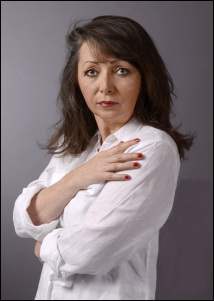
Judith O’Reilly
Authors links:
http://www.judithoreilly.com
@judithoreilly
You can sign up to Judith’s newsletter on her website and she’ll throw a short story at you, featuring her hero Michael North as a young boy.
Author bio:
Judith O’Reilly is the author of Wife in the North and A Year of Doing Good (both published by Viking Penguin, 2008 and 2013 respectively). Wife in the North reached number three in the UK bestsellers’ chart and was in the top ten for five weeks. It was also a top ten bestseller in Germany. It sold into ten countries, was serialised by The Sunday Times and the Daily Telegraph, was a BBC Radio 4 Book of the Week, and was based on Judith’s eponymous blog which was named as one of the top 100 blogs in the world by The Sunday Times. Judith’s blog is credited with kicking off the popularity of domestic blogging in the UK.
Wife in the North and A Year of Doing Good were both non-fiction. Killing State is a commercial political thriller and Judith’s first novel. At least the first one she’s allowed to leave the house without her.
Judith is a former political producer with BBC 2’s Newsnight and ITN’s Channel 4 News, and a former education correspondent with The Sunday Times where she also covered politics, undercover reporting and general news. She still writes for The Sunday Times, and has acted as a strategic communications adviser for both government and business.


